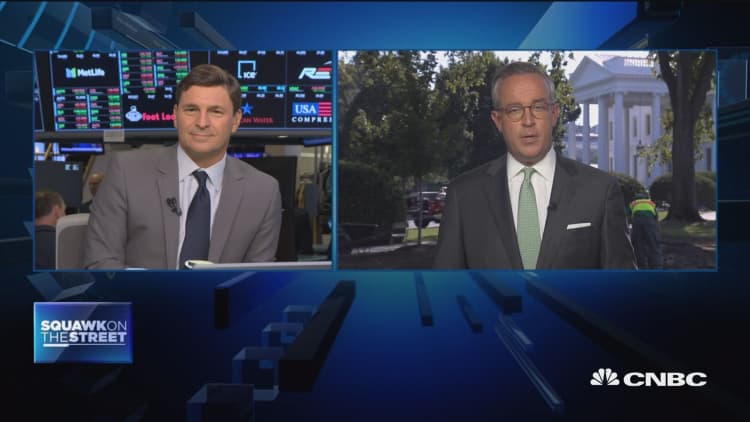
Resurgent hopes for tax reform in Congress are in turn generating optimism that at least part of the much-vaunted "Trump trade" could return to financial markets.
Sectors tied to President Donald Trump's economic plan for lower taxes, less regulation and a boom in infrastructure spending surged earlier in the year, but in recent months have lagged the market as Congress found itself tied up in gridlock, despite Republican control across the board.
But with GOP leadership expected to unveil a tax plan by midweek, investors once again are looking toward a shift in the market winds. The plan is likely to include a substantial reduction in corporate taxes, a lower tax rate for high-income earners, a higher standard deduction for the middle-income bracket and a general simplification of the code, among other provisions.
The big issues now will be filling in the blanks for the final legislative product.
"There's always been a risk premium in the market for tax reform. It's been difficult to measure at points," said Tushar Yadava, a strategist with BlackRock's iShares U.S. investment strategy team. "From the view in the market, tax reform is something that can be passed. The question is the magnitude of it and how far reaching it will be."
BlackRock is the industry leader for ETFs, managing $1.25 trillion under the iShares family.
Yadava sees clear sector winners emerging as the tax reform picture becomes clearer. Among those he expects to benefit are those often affiliated with the Trump trade.
Some of the key funds he's watching: the iShares U.S. Home Construction, iShares U.S. Aerospace & Defense, iShares U.S. Regional Banks and the iShares U.S. Broker-Dealers & Securities Exchanges.
These sectors carry some of the heaviest effective tax rates — the actual level they pay including deductions — and thus will benefit from an expected reduction of the corporate levy from 35 percent to as low as 20 percent.
Banks are a popular tax reform play as well, both because of lower taxation and the "lighter regulatory touch" from the Trump administration, Yadava said.
"There's a lot of focus because these are areas that have significant room to lower their effective tax rate," he added. "The Trump trade also included this idea of infrastructure spending as well. Maybe with that there's a little more nuance involved."
Generally speaking, a final tax reform package also is expected to benefit companies that do most of their business in the U.S.
Consequently, small-cap stocks have been roaring lately. The Russell 2000 index has touched all-time highs in recent days and even outperformed a market in a soft decline Monday.
"You're at a good point now. The market has been underestimating that there's a tax package coming in," said Matt Lloyd, chief investment strategist at Advisors Asset Management. Small caps are "also a good hedge. If you've been investing in foreign equities, it's another way of counteracting with some potential growth to mitigate some volatility you'd see in the later stages of this year."
Lloyd said investors also should keep a watch on the repatriation part of the tax debate — Congress is expected to come up with a proposal that will allow U.S. companies to bring home the $2.5 trillion they have stashed overseas, at a reduced rate.
Typically, those companies would be expected to return a sizable level of that cash to investors through dividends and buybacks. Lloyd said some other sectors that stand to benefit include consumer goods, telecom and health care.
Also, industrials could gain both through the infrastructure play and merger and acquisition activity that could get a lift from the influx of overseas cash.
"As companies look for ways to put their newfound cash to work, they will be looking for investments that generate the most attractive return on capital for their shareholders," said Ron Sanchez, chief investment strategist at Fiduciary Trust International.
Sanchez also said a simplified tax code could push millennials to start putting cash to work through purchases of big-ticket items like houses and cars.
WATCH: The final tax reform package may be a little less ambitious than once thought.



